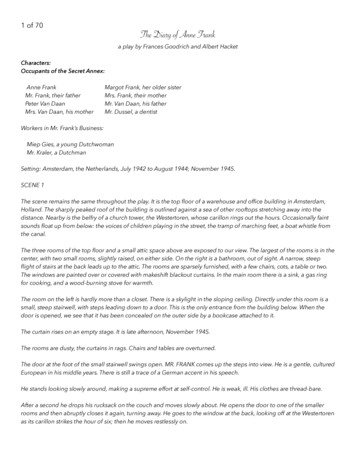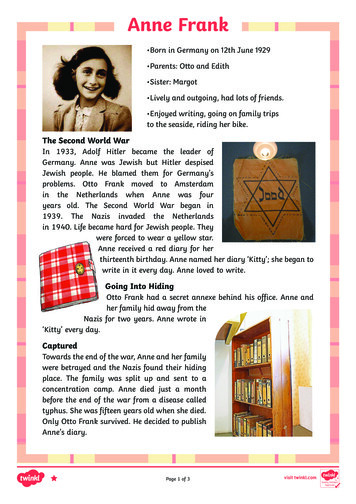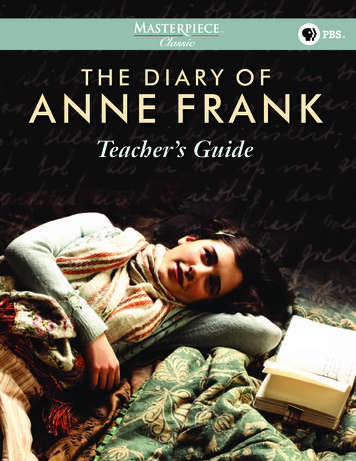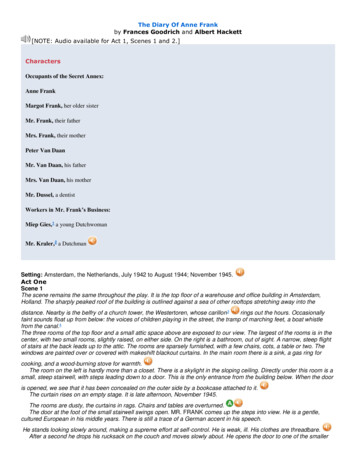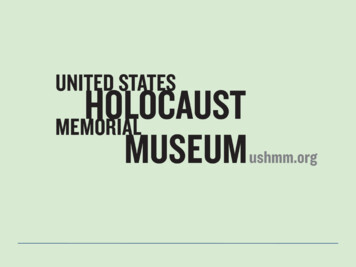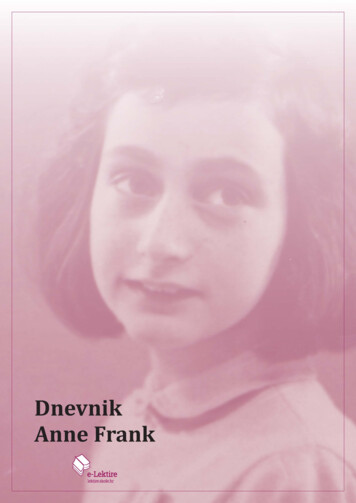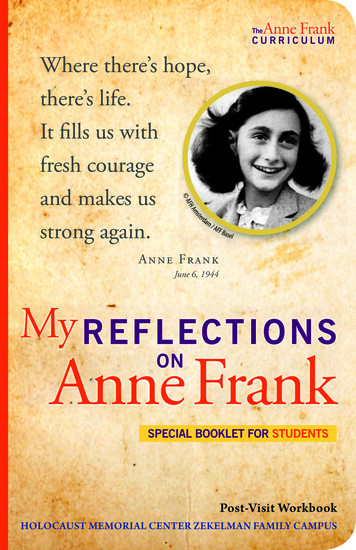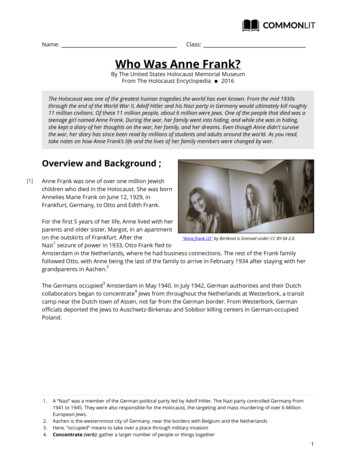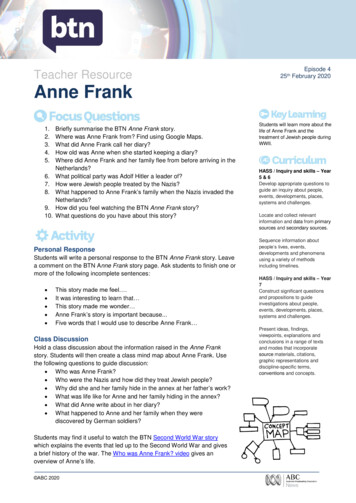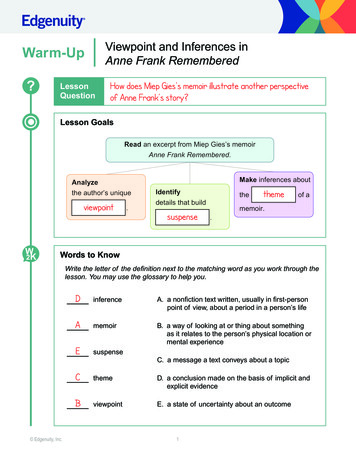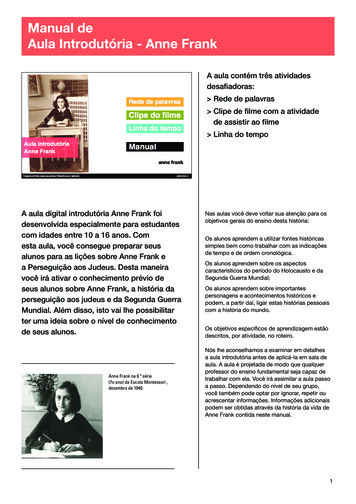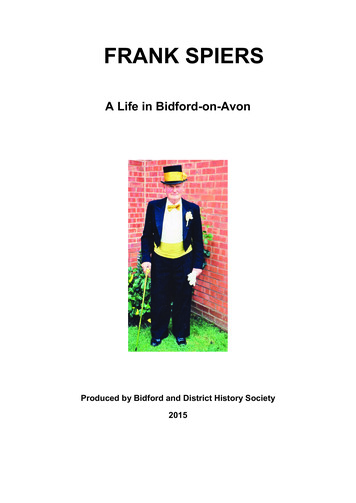
Transcription
FRANK SPIERSA Life in Bidford-on-AvonProduced by Bidford and District History Society2015
CONTENTSGROWING UP AT THE BULL’S HEAD . 3SCHOOL . .8GAMES I PLAYED AS A BOY . 9CHOIR AND SCOUTS .11EMPLOYMENT IN THE 1930s .12WARTIME .13WORK .20COURTING AND MARRIAGE 21SPORT 24BELLRINGING .27OUTINGS 29HOLIDAYS .32PARISH COUNCIL .36CARNIVALS .37STREET PARTIES .40SPECIAL MEMORIES .42INVESTITURE .442
GROWING UP AT THE BULL’S HEADI was born on 12 January 1925, the second child of Alfred and VictoriaSpiers who kept the Bull’s Head in Bidford-on-Avon. We often thinkabout how old we were when we can first remember things. One of thethings I can remember well was Dr Murray coming to see old GrannySpiers at the Bull’s Head. I was 4 years old when she died. He gave myelder sister Dinah and myself a ride round Broom in the dicky seat of hiscar. That was the first ride we ever had in a car. When Granny Spiersdied, I had started at the Infant School yet I remember things long beforethen. I must go back to when I was three.Frank and DinahMy Dad was a great handyman. He made us a rocking horse out of aFair Ginny horse given to us by Mr Wilson, the fairground person, andGranddad to young Tommy Wilson whom I boxed six times and ran theFairs in the later years. Dad made me a truck so I could collect thebottles back, or I would take big stone jars of water to people who hadrun out of water when the well ran dry. We only had a pump for freshwater and a cistern under the kitchen for soft water in the 1920s andearly 30s and we only had gas lights and gas for cooking. Before3
electricity came into Bidford in 1932 we had candles to go to bed with.Think how dangerous it was that the mattresses were made with straw.The water for washing and for having a bath in a zinc bath was heated inthe furnace.Outside the Bull’s HeadDad was a stonemason by trade, but one of his jobs, which we wouldwatch him doing when we came home from school, was to paint thenames on the breastplate for the coffins in black lettering for the localundertaker. Occasionally, when it was for a child, it was in white. Therewas no electric to do engraving. He would black a plate with smoke froma candle and then draw ships and other things in the soot.Many people in those days made home-made wine. Dad was one ofthem. They made Parsnip, Plum and Dandelion. Alf and Fred Bennettand myself would go with our pack baskets up to Cally to pickdandelions to make wine. The trains used to come up Cally Bank fromBroom via Bidford to Stratford. We put dandelions on the lines thinkingthe train would skid on the dandelions. The train was only going slow upthe bank. We got told off by the driver and fireman but they laughed it4
off. It was silly and we didn’t do it again. But we were only boys. I havenot mentioned Fred because he was only 4 or 5 at the time.Dad always kept a pig at the top of the garden. Of course, us childrenmade a pet of the pig. We used to help feed him. Some of his feed wasthe hops and malt from the beer barrel which he always seemed toenjoy. Once, when Dad was ill, Granddad Allen came and helped me.We gave him too much slops out of the barrel and the pig fell over andhe was grunting as though he was laughing. With help we got him backon his feet. Another time a pig got out, ran down the garden through thepub, out of the front door and down the street. I ran after him and caughthim. Dad followed and we managed to get him home.When November came, it was time for him to be killed up the top of theyard at the Bull’s Head. Mr Ernest Wilkes was the pig killer. Us children,Dinah, Fred and myself, were in the pub but we cried when we heard thepig squealing. The next day he would be hung in the passage at the pubfor everyone to see and he would hang there for three days before beingcut up. Granny Allen made the brawn. I held the chitterlings over thebath while Dad cleaned them with hot water.On Sunday mornings about midday they would have air gun shooting ata target on the lawn at the pub. I remember well old George Gill lyingdown and kept missing the target. They pulled his leg and he got hotunder the collar but the devils had only moved the sights. Poor oldGeorge! I was only a boy but the men used to get the home-made andcider down them. To me it was all good fun.I remember well if I had to go somewhere far Dad would take me, sat onthe cross bar of his bike. It was not unusual in those days. On SaturdaysI would go with Ray Cowper with his horse Tommy and the coal dray tothe Bidford railway siding to fill up with sacks of coal and deliver coalover the village. Mr Cowper sometimes let me have the reins to drive thehorse and cart. When we had finished delivering, he let me ride Tommyto a meadow over the Bridge. He would then bring me back to the Bull’sHead on the crossbar of his bike.Of course, living in the Pub, I got to know all sorts of people and many ofthem real characters, also many fishermen from Redditch andBirmingham who would come by service bus or by coach.5
From an early age, it was always my dream to go to Birmingham to seeAston Villa. Dad took me to Villa Park quite a few times. One of thecustomers used to take us in his car. Otherwise we would go by trainfrom Broom Junction to New Street Station then by tram to Villa Park.Christmas was always a special time of year. We always had a turkey ina wooden crate from Bulmer’s Cider, and Mr Evans from Littletonalways brought us a net of sprouts. Mr Langston from Marlcliff used tobring mistletoe and holly. My Dad was very clever with his hands anddrew ‘Happy Christmas’ and holly in soap on the mirrors in the Bull’sHead.When the bells rang for midnight service on Christmas Eve, Mother said‘It’s to call Father Christmas’. During the night when we were asleepFather Christmas brought us a pillow full of toys, clothes and sweets. Wehad presents from aunties and uncles as well as our parents. Iremember getting a football, a meccano set, board games, and books,especially football books.On Christmas morning we went to church, but then had to wait until afterthe pub closed at two o’clock for our Christmas dinner. We always madesure the people in the pub had all gone home before we sat down.From the age of twelve or so, Jack Smith and myself went carol singinground the big houses in Icknield Street and The Grange. Dr Crawford,who lived in Blythe House, invited us in to sing, so did Sir RaymondBrookes, who lived at Avonside. They gave us five shillings each. Wewent to about five houses altogether and if we didn’t get five shillings wegot at least half a crown.When Dad died aged 42, I was 9 years old, Dinah was 12 and Fred was6. I helped Mother all I could. I was a big boy which you can tell from theSchool photos. Dinah did a lot of the cooking. Mother then took over aslandlady of the Bull’s Head. It wasn’t easy in the 1930s. Men didn’t havea lot of money to spend, and because she had a business she had nowidow’s pension to help keep us youngsters going.6
Frank, Fred and DinahAs I got older, I played quoits with the men. We also played shovehalfpenny and skittles. The men sat a lot and played card games, cribbeing the most popular. Although I was young, I helped Mother serve thebeer and cider. Men drank a lot of cider, a lot of men especially thebusiness men, just liked to talk. Darts did not come into the pub till 1935.The first dartboard we had was plasticine which we had to roll everynight until the traditional dartboard came along. Very few families had awireless, and every Saturday night at six o’clock men would come in thepub with their pencil and paper to take down the football results. TheSports Argus came round at 8.00pm, price 2d. At weekends a cousin,Dot Sandiland, aged 25, came from Redditch and helped Mother till wegot older.From 11 to 14 years I did a paper round for Mr Jones on the Bank. Iwould leave on my bike at 6.30am and deliver the papers up VictoriaRoad and Broom. Victoria Rd was just a straight road, Steppes Piecehad only just been built, and Broom was less than half the size it istoday. Papers were a penny a day and a penny a week delivery. Thepapers then were the Daily Mail, Daily Express, Daily Telegraph, Daily7
Herald, News Chronicle, Daily Sketch, Daily Mirror, Birmingham Postand Birmingham Gazette.On the way home I would see many people walking or cycling to BroomJunction to catch the train to Birmingham or Evesham. I returned homeby 8 o’clock, I had my breakfast and it was time to go to school. In theevening I would meet the 6.20pm train from Birmingham with theEvening Mail and Evening Dispatch. It was going on to Ashchurch viaEvesham. I was always interested to see the steam train. Sometimes ithad a named engine. For my newspaper round I had five shillings aweek.The other little job I did was for Mr and Mrs Parker who owned Noakes &Crofts, the grocers in the village and lived next door to the Bull’s Head. Ihad to pump the water up into the tank. For this I had 2s.6d a week andalways a nice piece of home-made cake for tea. So with Mother givingme a few pennies for collecting the bottles I had enough money someSaturdays to go on the train from Broom to Birmingham for 11d, thenpay 2d on the tram to Villa Park and 1/- to see Aston Villa play football.SCHOOLI started at the Infants School, which is where the Church Room is now,when I was four years old. We had two classes and there were aboutsixty of us. Class 1 was taught by Miss Smith who lived in Marlcliff. Class2 was taught by the Head Teacher, Miss Jackson, who lived in theSchool Cottage. We did reading, writing, English dictation, arithmeticand art. One memory that has lived with me for over eighty years washaving to write ‘said’ one hundred times after spelling it ‘sed’.When I was seven, I went to the old Junior School in Victoria Road. Theteacher of Class 1 was Mrs Warner, Class 2 had Miss Thomas, Class 3was taught by Mrs Armitage, Classes 4 and 5 by Mr Dick Noise andClasses 6 and 7 by Mr Warner, the Headmaster. We used to doArithmetic, English, History, Geography, PT and also gardening, wherewe used the allotments. Mr Warner was a good amateur actor. Thisrubbed off on his pupils and every year we performed plays in the Co-opHall. Mr Warner would write the play on the blackboard and we wouldcopy it into our books then learn the words.8
Infants School 1932GAMES I PLAYED AS A BOYWhen we were children in the 20s and 30s, we were able to play gamesin the streets as there was very little traffic about. We had iron hoopsand hooks and we kept running round the roads with them. We eventook them to school and played round the playground. They were madein different sizes by Harry Wilcox, the blacksmith in Icknield Street. Wealso played whip and top in the side streets. Then there was marbles.You had a bag of clay marbles from Mrs Elsmore’s village shop. Someboys had a glass ally or a ball bearing. Each player put two marbles in acircle and whoever knocked the marble out of the circle kept the marble.In the conker season we played conkers on a piece of string and youwould try to hit the other conker till it broke.Another popular mixed game was ‘Fox and Hounds’. One boy would gooff as the fox and others would try to catch him. To know where the foxwas the hounds would shout ‘Holler’ if you were far away and ‘Squeak’ ifyou were near. Another mixed game was Hopscotch, also Johnny Onthe Mopstick and Off Again. We also did a lot of skipping outside theBull’s Head and War Memorial, boys and girls sometimes together with along rope. We would play many ball games with a rubber ball.As we got older, we used to play football in the Co-op field, which is nowSaxonfields, or go to a meadow which we called the Leys which is now9
Crompton Avenue and was then owned by Mr Fred Holder at Marleighwho never minded us youngsters playing there. In those days we onlyhad one ball between us. If the bladder burst and we could not mend it,we stuffed it with paper. It was heavy but it did not stop us playing. Wewould play in the fields round Grange, which was where the villagecricket ground was in the early 1930s. Later in the thirties the cricketground moved to the Big Meadow. Some boys went fishing usually withan adult close by.In the summer months we would go down ‘Dovehouse’ Lane at the backof the Church and paddle in the river. As we got older, people wouldteach us to swim on rushes so that we never got out of our depth. It wastoo dangerous. Another dangerous thing we did was to climb up quitehigh on those tall trees in ‘Dovehouse’ Lane, never thinking howdangerous it was but as luck would have it, I can’t remember anyonegetting badly hurt.We would play a lot on the lovely lawn at the back of our home at theBull’s Head. In those days the area that is now the Catholic Church andcar park, Quineys Court, the Relief Road, Marleigh Estate and BlenheimClose, was full of meadows, orchards and smallholdings. A group of usyoungsters used to go on some lovely walks round Bidford. We didn’thave television or computers to worry about and not everyone had awireless. We boys and girls played tracking. We did a lot of walking toMarlcliff and on to Cleeve Prior down by the Mill. At other times wewalked round Barton or Broom. I remember a small wood called‘Singfields’ which was full of beautiful violets. We always took a bunchhome to Mother. In the winter when the snow came, it was the perfectplace for sledging on those hills.We always had something to do. There would be Boys Club onMondays, when the Vicar, the Rev Harrison and Dr Murray alwaysjoined us in the Church Hall. Boys Choir was on Tuesdays, the full choirpractice on Fridays, and Boy Scouts on Wednesdays.10
CHOIR AND SCOUTSDuring the 1930s, from the age of six to fourteen, I sang in the StLaurence Church Choir. We had a very good Church Choir under thechoir master, JWP Styles (Jackie Styles). He was only a young man inhis early 20s, and he cycled from Stratford every Tuesday and Fridaysfor Practice and Sundays for Matins and Evensong. There were fourteenboys, seven each side, six ladies mainly altos, and ten men, bass andtenors.The Tuesday practice was for boys only. There would always be fourboys, acting as probationers, ready to step in when older boys’ voicesbegan to break or someone was ill. The Friday practice was for the fullchoir including the Vicar, the Rev AW Harrison. We would sing descantsto many Hymns, all different settings to Psalms, at Matins the Venite andTe Deum, and at evensong, the Magnificat and Nunc Dimittis. OnFestivals we always sang an Anthem with one of the boys singing asolo. On Good Friday we sang Stainer’s Crucifixion, and on the Sundaybefore Christmas we used to sing part of Handel’s Messiah. Jack Styleswas the conductor and Peter Brough, who was the organist at HolyTrinity, Stratford, used to come and play the organ. A couple of soloistsalso came from Stratford.I remember very well one evening in 1937, the whole Choir going bycoach to a Choir Festival at the old Coventry Cathedral, three yearsbefore it was destroyed by the air blitz in1940. We changed into ourcassocks and surplices in the Law Courts, then processed into theCathedral to partake in a wonderful service of choral singing.For six years the boys won the Leamington Musical Festival for VillageChoirs. The full Choir won it three times and Mr Styles even got theBidford WI Choir good enough to try. To recompense us boys, Mr Stylesorganised football matches against Holy Trinity, Stratford, and AlvestonChoir boys on the NFU ground where Mr Styles worked. He also took usto Pantomime at the Shakespeare Theatre at Christmas time. We alsohad a Choir and Bellringers outing in a coach to Weston-super-Mare,Bournemouth and Aberystwyth. The day we went to Aberystwyth wesaw King George V and Queen Mary in an open carriage. They hadcome to open the new Welsh University.11
When I was 12 years old, Bidford had a very active Boy Scouts Group.We met every week in a room at the Bidford Brick Yard in WaterlooRoad, the home of Scout Leader Howard Gallimore, land which is nowthe Industrial Estate. We also had a Patrol Leader, Horace Taylor, wholived in Steppes Piece. We did all the things Boy Scouts did: tyingdifferent knots, map reading and signalling. Twice a year in the summer,we would go on our bikes and camp in a field by the River Avon atLuddington for two nights, having a camp fire on which to cook our foodand sing Scout songs round the fire. To us boys it was great fun.I can remember well going to a big Jamboree of Scouts from all over thecountry in Handsworth Park, Birmingham in 1937. Another time Iremember well was in 1938 when all the Scouts from Alcester, Bidfordand Studley did a Guard of Honour to the Duchess of Gloucester at theopening of Studley Castle as an Agricultural College. Again ten of uscycled to Studley.Then in 1939 when the War started, young men were called into theservices and Bidford scouting lost its leadership. Scouting then movedon to Salford Priors who have had a strong Boy Scouts Group for years,which is good for Bidford boys who want to do scouting.EMPLOYMENT IN THE 1930sI often think of what people did for employment in the twenties andthirties. I remember well about 40 men working at the Bidford BrickWorks. Most of the houses built in the late nineteenth and early twentiethcentury, like the houses in Icknield Street and Victoria Road, were allbuilt with Bidford bricks. The brickyard was where the industrial estate issituated in Waterloo Road.Many men worked on the farms and market gardens growing fruit andvegetables. A lot of the ploughing was done by horses pulling theplough. Some was done by steam engines from Bomford & Evershedsand Bomford Brothers at Pitchill. Mr George at Wixford Lodge wouldemploy 20 men, Mr Longford employed many men at Tower Hill Farm,and Fred Holder at Marleigh and Harry Smith on Tower Hill employedmany men looking after cattle and growing fruit and vegetables on landthat is now Crompton Avenue, The Leys and the Marleigh Estate. Manywere also employed at Broom Court and Broom Flour Mill. Other men12
worked in the local building trade as bricklayers, carpenters, plumbersand electricians. Many cycled to Stratford to NFU and other businesses.Others would cycle to the Cabinet Works and Terrys at Alcester.Many young girls went into service at the large houses and wealthypeople in the area they lived in. Bickmarsh Hall employed a lot of labourfrom Barton and Bickmarsh but it is surprising the amount of people whohad their own smallholdings and grew vegetables and fruit. I used to seemen taking their goods by horse and cart to Bidford railway siding to goby train to Birmingham, Manchester and Glasgow. A few lorries tookgoods to Birmingham, Coventry and Leicester markets. Of course, manylocal people worked in the village shops. In those days people did mostof their shopping in the village. You only went to Evesham or Stratford tobuy a new suit or shoes.Many women went off when the children had gone to school to do peaand bean picking, also fruit picking, especially apples, plums,gooseberries and strawberries. You would see them in their lovely whitehats. There were some real old characters amongst them. They wouldpush an old pram with their food and drink for lunch and probably ayoung baby. Not many families had holidays. They could not afford one,but everyone had to have a week off from work by law, so the men wentfruit picking.WARTIMEWhen I was 16, the war was on and everyone had to do some kind ofservice. Some men were Air Raid Wardens, some were in the ObserverCorps, and others joined the Home Guard. A few of us younger ladsjoined the Home Guard as messenger boys. When on night duty, weslept in the cell at the Police Station with the policeman, Bill Munday. Ifany messages came through by phone, us boys used to run up to theHome Guard Platoon on duty in a house in Waterloo Road. I wouldcome off duty at 6.00am, change my clothes, have breakfast, and by6.30 I would be off on my cycle to work at the BSA in Redditch.I enjoyed the Home Guard. It was like Dad’s Army. You had the oldsoldiers from the First World War who took it very seriously, even thoughthey were in their 50s. Our platoon formed up in Icknield Street at9.00am on a Sunday morning. John George, from Wixford Lodge, was13
our Lieutenant, Wilf Busby (‘Cloggy’) was the Sergeant, and theSergeant Major was Mr Blakeman from Exhall who had been in theArmy. We used to go in the fields round Grange and do drill andexercises. Mr Blakeman, who was a real good old Sergeant Major,taught us piling arms, a drill they did in the First World War. It was reallyeffective. Not in all the time I was in the Guards did we ever do that drill.On Wednesdays we all met at the High School where regular officersand sergeants from the Army would come and lecture us on guns,ammunition, tactics and grenades etc. We would go to Ragley Hall andjoin up with the Alcester and Studley Companies, which together formedthe Battalion under the Command of the Lieutenant-Colonel. Overall,the Home Guard gave me a useful insight for when I later joined theGuards. I knew how to march and handle a rifle and quite a few otherthings.I still went off and did my amateur boxing every week. Boxing was moreof a midweek activity. I went to places like Dudley Town Hall, Brierley HillTown Hall, Evesham, Stratford and Wolverhampton. Many of the largefactories in Birmingham and Coventry had Boxing Clubs, like me boxingfor the Austin Boxing Club. In 1942, when I was 17 years old, Dr Murraytook me to see Joe Louis, the Heavyweight Champion of the world, givea boxing exhibition at the American Army Camp. That was where LongLartin Prison is now. How good of the Doctor to take a young village ladto see the Champion of the World.When I was 18 in 1943, like most boys of my age, I was called up to goto Worcester to join the Forces. They wanted to put me in the RoyalWarwicks or the Worcestershire Regiment but I wanted to go in theGrenadier Guards, so I had to volunteer. Off I went by train to London,then on to Caterham where an Army lorry was waiting to take 20 of usup to the Guards Depot. It was late at night so we had to sleep it a bitrough the first night. The next day we were sorted out to go to ourrespective Squads, and met our Squad Instructor, Sergeant Bundock,and trained soldier Glew, who looked after us in the Barrack Room, andtaught us to look after our kit. We were soon on the Barrack Square.This is where my time in the Home Guard came in useful since it hadgiven me a good idea of what to do.14
I had only been at the Guards Depot six weeks when the Sergeant Majorcame into the Barrack Room asking if anyone would have a go at Boxingfor the Depot Championships. He was having a job to get anyoneinterested, but I said, ‘I’ll have a go Sir’. He said ‘Good’. I had sometraining with some other Grenadiers, then came the Guards Depot15
Championships between the Grenadiers, Coldstreams, Scots, Irish, andWelsh. I managed to win the Light Heavyweight division, then I alongwith a Scots Guard at Middleweight and an Irish Guard at Welterweight,were selected to go for the London District Championships at ChelseaBarracks.Brigade NCOs 1946The three of us went for special training in the gymnasium with aSergeant Anthony of the Army Physical Training Company giving usspecial training in the evenings. He would then take us to the cookhousewhere we had as much food as we wanted. After three weeks we wentin the back of a lorry (there were no coaches in wartime), to Chelsea forthe London District Championships Finals. Early afternoon I had my firstfight and got through to the Semi-finals. Many Officers and NCOs camefrom Caterham to see the finals. Early evening came and I was getting abit nervous with the atmosphere. The Semi-finals came, by which time Iwas feeling more confident and I had a lot of support. I went on to winquite easily.16
Boxing for the GuardsThe Final came quite late, about 9 o’clock, against a Sergeant from the1st Battalion Coldstream Guards. I felt quite good but a bit nervous. I wasonly 19 and he was about 24. Sergeant Anthony was good in my cornerand I was cheered on by the Officers, Sergeants, and Guardsmen whohad come up from Caterham to support me. I felt confident and wonquite well. Of course, the next day back at the Guards Depot Caterham Ihad to go before the Commanding Officer to be congratulated.Jack Gardner of the 1st Battalion Grenadiers won the Heavyweightdivision. Jack was stationed at Windsor and after I finished my training atthe Guards Depot, I joined up with Jack at the Training Battalion atVictoria Barracks, Windsor. We both went on to represent LondonDistrict at Boxing. To keep us fit, we would run to Slough Social Centrefor extra boxing training. Jack went on to be professional HeavyweightChampion of Great Britain. He came from Market Harborough. Sadly, hedied aged 54. The other two Guardsmen failed to reach the Finals of theLondon District at Chelsea.While at Windsor, the Training Battalion was inspected by the 18 yearold Princess Elizabeth who was then Colonel of the Grenadier Guards. I17
was 19 at the time. When she became Queen, she became Colonel-inChief of all Regiments. The Duke of Edinburgh took over as Colonel ofthe Grenadier Guards. I have a photo taken by the Daily Sketch as thePrincess passes by us young Grenadiers.After our training at Windsor, we travelled by train to Minehead inSomerset where we trained coming off the sea, did a lot of exerciseswith live ammunition on Exmoor, waded in the rivers and camped in ourground sheets. We had to work hard and be realistic that the war wasstill on. We had soon got to be ready for Europe, and after two monthson Exmoor the Company came back to Windsor where we stayed fortwo weeks before going to Dover ready to go to Calais. There seemed tobe no hurry as the war was coming to an end. When we got intoGermany, it was to relieve the other Guardsmen to enable them to comeback home. Our platoon of 40 men went into a large Mansion House. Aswe had no PT Instructor, with my fitness from boxing, I was selected totake the men for PT. I also played in the Battalion Football team and didCross Country Running. When the 4th Battalion moved into a Barracksnear Bonn, I was sent on a PT course in Bonn.Bonn is the birthplace of Beethoven who is like Shakespeare is toStratford. I have always loved classical music, so I spent some pleasantevenings at the theatre. Just after the war cigarettes were like gold in18
Germany. I did not smoke and we had 50 cigs a week, so I had a goodseat from the doorkeeper for a few cigs in return.I joined the 4th Battalion at Eiskirchen Barracks near Cologne where Iwas promoted to a Corporal. All the Guards Battalions in Germany had aboxing team so I was soon roped into that, the only trouble was I wantedto be a soldier and get on but I enjoyed both. One of the duties we didwas guarding Prisoner of War Camps along the border between Eastand West Germany. The Russians were on one side and us the other.After a while the 4th Battalion moved up to North Germany, nearHamburg. The city had been terribly bombed. However, the OperaHouse had not been touched so I went to a number of orchestralconcerts there. I went on another PT Course in another beautiful city,Lubeck, which was near the Harz Mountains, an area we could go whenwe were on a short leave. It was too far to go from Cuxhaven to Hullthen to Bidford. It would have been time to go back. Eventually, the 4thBattalion disbanded, the Guardsmen being demobbed and theGrenadier Guards reverted back to its peacetime strength. Some weredemobbed from 3 Battalion whilst others went to other Battalions, butfour of us NCOs went back to the Guards Depot at Caterham to be DrillInstructors to train recruits. That is where I stayed till I was demobbed.I enjoyed my service in the Grenadiers, and so I was thrilled when myson John joined the Regiment at 17 years old. The first time Gian andmyself saw him in his scarlet tunic and bearskin was at the laying up ofthe colours at Ely Cathedral and marching through the City of Ely. TheDuke of Edinburgh attended the service and took the salute as Colonelof the Grenadier Guards. After the parade the Grenadiers dismissed tothe Drill Hall in Ely. Gian and I went to see John and we were asked togo into a side room with six other parents. When John joined us, wewere introduced and shook hands with the Duke. We were the only twowhere father and son had served in the Regiment. The Duke had a goodchat with us.Another time we felt proud was going to see John in the Trooping of theColour on Horse Guards Parade. He was then in Queens Companywhich is the number one Company of the 1st Battalion GrenadierGuards. We saw him six times in the Trooping of the Colour, though not19
every year, because he did two years in Ireland and also spent time inGermany and Kenya.I don’t think any army in the world would do the Trooping of the Colourlike we do. In 2000, to celebrate the Duke of Edinburgh’s 25 years asColonel of the Grenadier Guards, the Queen invited all servingGrenadiers and old comrades to a Garden Party at Buckingham Palace.Six years later, I was invited to attend another Palace Garden Party tocelebrate the 350th Anniversary of the formation of the Guards, Gianhaving sadly passed on by this time, I was able to take our daughter Jill.We were entertained by the Band of the Grenadiers, with the Queen andthe Duke of Edinburgh and other members of the Royal Family walkinground talking to people.WORKAfter I left school at the age of fourteen in 1939, I used to cycle twelvemiles every
sixty of us. Class 1 was taught by Miss Smith who lived in Marlcliff. Class 2 was taught by the Head Teacher, Miss Jackson, who lived in the School Cottage. We did reading, writing, English dictation, arithmetic and art. One memory that has lived with me for over eighty years was having to write 'said' one hundred times after spelling it .
